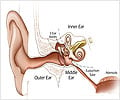A Northwestern University neuroscientist will argue that music training has profound effects that shape the sensory system and should be a mainstay of K-12 education
A Northwestern University neuroscientist will argue that music training has profound effects that shape the sensory system and should be a mainstay of K-12 education. His press briefing will be held at the American Association for the Advancement of Science annual meeting.
"Playing an instrument may help youngsters better process speech in noisy classrooms and more accurately interpret the nuances of language that are conveyed by subtle changes in the human voice," says Nina Kraus, Hugh Knowles Professor of Neurobiology, Physiology and Communication Sciences at Northwestern University."Cash-strapped school districts are making a mistake when they cut music from the K-12 curriculum," says Kraus, director of the Auditory Neuroscience Laboratory in Northwestern's School of Communication.
Kraus will present her own research and the research of other neuroscientists suggesting music education can be an effective strategy in helping typically developing children as well as children with developmental dyslexia or autism more accurately encode speech.
"People's hearing systems are fine-tuned by the experiences they've had with sound throughout their lives," says Kraus. "Music training is not only beneficial for processing music stimuli. We've found that years of music training may also improve how sounds are processed for language and emotion."
Researchers in the Kraus lab provided the first concrete evidence that playing a musical instrument significantly enhances the brainstem's sensitivity to speech sounds. The findings are consistent with other studies they have conducted revealing that anomalies in brainstem sound encoding in some learning disabled children can be improved with auditory training.
The Kraus lab has a unique approach for demonstrating how the nervous system responds to the acoustic properties of speech and music sounds with sub-millisecond precision. The fidelity with which they can access the transformation of the sound waves into brain waves in individual people is a powerful new development.
Advertisement
By comparing brain responses to predictable versus variable sound sequences, Kraus and her colleagues found that an effective or well-tuned sensory system takes advantage of stimulus regularities, such as the sound patterns that distinguish a teacher's voice from competing sounds in a noisy classroom.
Advertisement
"Playing music engages the ability to extract relevant patterns, such as the sound of one's own instrument, harmonies and rhythms, from the 'soundscape,'" Kraus says. "Not surprisingly, musicians' nervous systems are more effective at utilizing the patterns in music and speech alike."
Studies in Kraus' laboratory indicate that music -- a high-order cognitive process -- affects automatic processing that occurs early in the processing stream. "The brainstem, an evolutionarily ancient part of the brain, is modified by our experience with sound," says Kraus. "Now we know that music can fundamentally shape our subcortical sensory circuitry in ways that may enhance everyday tasks, including reading and listening in noise."
At 3:30 p.m., Saturday, Feb. 20, Kraus will present "Cognitive-Sensory Interaction in the Neural Encoding of Music and Speech" as part of a panel on music-language interactions in the brain at the annual meeting of the American Association for the Advancement of Science.
Source-Eurekalert
RAS









